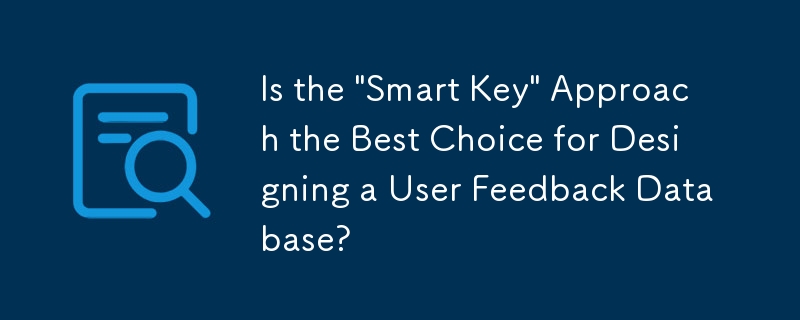

Designing an Optimal Database Model for User Feedback Systems: Re-examining the "Smart Key" Approach
The presented database model for a user feedback system raises concerns regarding its suitability and adherence to best practices. While the "smart key" approach may seem like an innovative solution to ensure data integrity, it introduces several complexities and challenges.
Criticisms of the "Smart Key" Approach:
The primary criticism of the "smart key" approach lies in its violation of the relational database principle of atomic values. By encoding information in the keys (eg. "participant ID"), the model introduces the need for string comparison and hinders efficient range-based aggregations. Moreover, this approach complicates database refactoring and imposes an order that may not align with optimal query patterns.
An Alternative Approach:
A preferred alternative involves employing two-column primary keys and foreign keys, eliminating the need for "smart keys" altogether. This design adheres to the simplicity and effectiveness of "dumb keys," providing a robust and scalable solution.
Automatic Primary Key Generation:
Some database management systems (DBMSes) offer the capability to compute primary keys automatically based on values in other columns. However, it is generally recommended to avoid using this approach for primary keys or foreign keys. Computed columns, if persisted, consume memory and can hinder performance.
Addressing Subtype Handling:
The true challenge in this design lies not in the primary key structure but in handling database/SQL subtypes (in this case, different types of feedback). This aspect requires careful modeling to accommodate various feedback types and enforce appropriate constraints.
Ultimately, the "smart key" approach presents several drawbacks that render it less suitable than a simpler and more conventional database model. By embracing "dumb keys" and employing proper handling of database subtypes, a more robust and maintainable feedback system can be created.
The above is the detailed content of Is the 'Smart Key' Approach the Best Choice for Designing a User Feedback Database?. For more information, please follow other related articles on the PHP Chinese website!
 How to connect broadband to server
How to connect broadband to server
 HTTP 503 error solution
HTTP 503 error solution
 How to skip connecting to the Internet after booting up Windows 11
How to skip connecting to the Internet after booting up Windows 11
 How to turn on Word safe mode
How to turn on Word safe mode
 The role of html title tag
The role of html title tag
 jquery animate
jquery animate
 kb4012212 What to do if the update fails
kb4012212 What to do if the update fails
 What to do if the embedded image is not displayed completely
What to do if the embedded image is not displayed completely
 How to export word from powerdesigner
How to export word from powerdesigner




